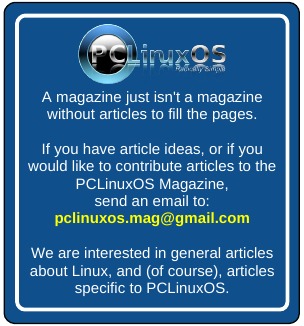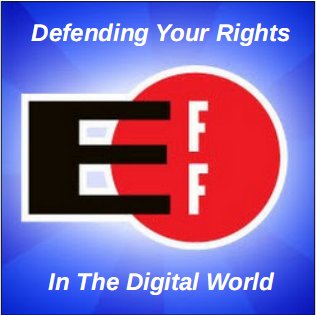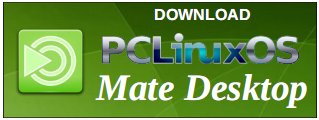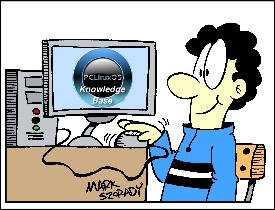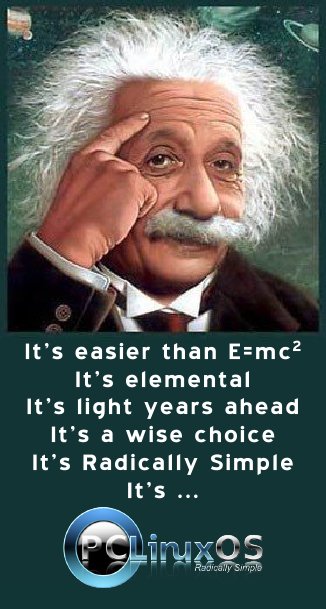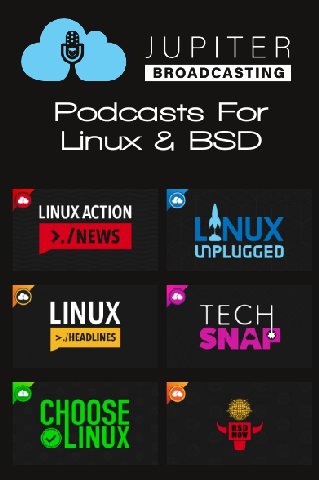| Previous
Page |
PCLinuxOS
Magazine |
PCLinuxOS |
Article List |
Disclaimer |
Next Page |
Focus On Software Patents & Copyright |
|
Editor's Note: This pair of articles shines a light on the persistent threat posed by software patents and copyrights. The threat of software patents persists
by Free Software Foundation  At the Free Software Foundation (FSF) we have reported extensively on many issues concerning user freedom. In this article, we will reintroduce a problem that has plagued the free software community for many years: the problem of software patents. In the past, we had several successful campaigns against them, and people have mistakenly assumed that the threat has gone away. It has not. Patents have steadily been dominating the software sector, and the situation is bound to get worse. Before we delve into the complexities of this issue, it's important to know the basics: a patent is a legal tool that gives its owner the right to prevent others from using an invention in any way for a limited period of years. A software patent is a patent that applies to software. What follows will answer a number of questions: what software patents are; what their history is; what their legal status is today; what problem is posed by their enforcement; how our past successful campaigns were not enough to eliminate them; and finally, how you can help us fight against them, today. Unfortunately, for a proper explanation we ought to get a bit technical, but please bear with us. A brief history of software patents First, of all, the concept of software patents has been around for a long time (even since the 1960s), but the debate on the patentability of software became widespread when the Free Software Foundation was founded in the 1980s. While the FSF does not take a position on the impact of patents in other spheres, we consider them to be both unethical and counterproductive in the field of software. One of the most worrying effects of software patents is the way they prevent new software from being written, yet even if this weren't the case, software patents would still be an inherently unethical restriction on individual freedom. Even in the 1980s, it was clear that the magnitude of the problem was such that Richard Stallman founded the (now defunct) League for Programming Freedom in 1989, an organization aiming to ally all developers (including those of proprietary software) against software patents. Today, few people are aware of the dangers behind software patents, and how the world is affected by them. To give a quick overview, in the US, patents are handled by the federal courts, while Europe has different, independent national laws on patents. Recently, however, the adoption of the Unitary Patent and the Unitary Patent Court are bound to replace regulations of individual EU member states with ones that are valid for the entirety of the EU, making (software) patent enforcement in Europe drastically easier. Globally, each country has unique patent laws and the patentability of software may differ considerably. But the general picture is that software patents are continuously granted. It is crucial to emphasize that software patents are enforced without ever going through a process of direct approval by the public. In 2002, a proposal was made to legitimize software patents in the EU, but it was defeated in the European Parliament by an overwhelming majority of 648 to 14 votes, thanks in part to a massive effort by the free software movement and its allies. The success of that campaign demonstrated that people are able to change the course of proposed life-affecting policies, provided that they are included in the process, and properly informed. Unfortunately, the course of events both then and now also proves that democracy requires the utmost vigilance, and any period of relaxation works against the will of the people. Despite the defeat of the software patent directive in 2002, the software industry has successfully pushed for new policies that will favor it. This is where the aforementioned Unitary Patent and Unified Patent Court come into play, since it is well known that the European Patent Office has a vested interest in expanding patent dominance in all fields, particularly in the software sector. Software patents constitute a critical attack on user freedom The issue of software patents is a particular one. To understand the extent of patents, it is necessary to distinguish patent law from copyright law. While copyright covers the original expression of an idea (for example, software and literary works), patents cover inventions. There is an important difference here. Copyright is applied automatically, whereas patents require a formal registration process. Also, in the case of patents, patent examiners have to judge which patent application falls within the criteria of a patent-eligible invention. This task can be very complicated, since the range of technical claims is by nature extremely wide. So, the question is: can software be regarded as a patent-eligible invention? We believe it cannot. Software should not be patentable, because it is inherently composed of mathematical logic, which is excluded from patentable subject matter. In practice, the effects of software patents are so restrictive that they affect the development of all kinds of software, not just free software. While the most common argument for patents is that they promote innovation, the opposite is true more often than not. Every time a programmer develops new software, it is almost inevitable that they will infringe not one, but many patents. One reason for this is that patent offices around the world have applied particularly lax criteria for software patent registration. Another reason has to do with the nature of software on general purpose computers. As such, developers walk into an invisible patent minefield, since no one can practically be aware of all the patents in the world. Naturally, one would ask: is this a problem just for software patents or patents in general? The answer is not so simple. Some people may have arguments against patents in general, but the special case of software patents is in fact widely acknowledged. In an apt article, Richard Posner pointed out that in order to define an invention under patent law, we must evaluate both the cost of inventing and the cost of copying. At one extreme, we have the pharmaceutical industry, which has very expensive production costs, but very cheap reproducibility of its products, and claims to be financially dependent on patents. At the other extreme, we have the proprietary software industry, which already uses copyright as a means to curtail user and developer freedom, and which has now roped in patent law to assist them in that. Software, with its inexpensive production costs, has never been financially dependent on patents: in the matter of fact, not only is there more than adequate proof that software can and does progress without patents, but patents can also actively prevent that progress from happening. Battles were won, but the war is not over So how are software patents issued? Although at a high level, patent laws around the world regard software as abstract, non-novel ideas, and thus not patentable, lawyers are able to fool judges with clever wording of their technical claims. For example, in Europe, proponents of software patents -- mainly multinational corporations and patent lawyers -- avoid using the term "software patent," because they know it reveals their intentions. Article 52 of the European Patent Convention explicitly forbids patents for "programs for computers," but only when inventions are regarded "as such." The European Patent Office interprets the "as such" as nullifying the exclusion. As a result, software patents are issued in Europe despite the rejection of the relevant directive in the past. Similarly, in the US, the term "computer-implemented invention" has become rather popular, but its definition is ambiguous on purpose. Despite Supreme Court cases Alice and Bilski being regarded as having restrictive rulings on the patentability of software, the judges chose not to clear the legal landscape. Today, there are still many court case inconsistencies, and the US Patent and Trademark Office continues to grant software patents. We can only strengthen our cause with your help If everything above sounds confusing, that's because it is. The issue of software patents is very complicated, and most people have never even heard of the term. In any case, the end result is that software patents are still being issued. In this article, we have only scratched the surface in regard to how software patents affect us. If you are unfamiliar with software patents, you can learn more at our End Software Patents wiki. If you are familiar with the issue, please consider contributing to the wiki. Every contribution helps. In a world where multinational corporations have unlimited political influence, while citizens are deprived of the necessary democratic mechanisms to control them, the future is bleak. At the same time, the acceleration of technological progress in the recent years has led to an astounding ubiquity of software in all fields of life. With software patents being granted in every digitized sector, the significance of user freedom increases exponentially. Consider this: when we were kids, we looked forward to the future with eager anticipation. Most of us imagined an automated world, with robot servants and flying cars. Growing up, many of us regrettably realized that the dominance of proprietary software has been turning all these futuristic ideas into an Orwellian universe. Proprietary software threatens user freedom. But software patents affect us to an even more fundamental degree: they limit our very ability to write software that respects user freedom, undermining our freedom of expression. If we do not act, the future is bleak. To shape a free world, we must cooperate. Our End Software Patents campaign, including its wiki, was created years ago, but we are now in the process of renovating it. If you believe our cause is just, you can join us. Whatever your background, there are many ways to help: from educating others about this issue and participating in discussions, to influencing your country's policies, to contributing to our wiki with new information. End Software Patents has a rich past, such as submitting amicus briefs to courts, creating the Patent Absurdity documentary, and featuring almost 650 wiki entries, as well as dozens of articles. If you're interested in the campaign and would like to get involved, you can join our effort in the following ways: Donate to End Software Patents
The Federal Circuit Has Another Chance to Get it Right on Software Copyright
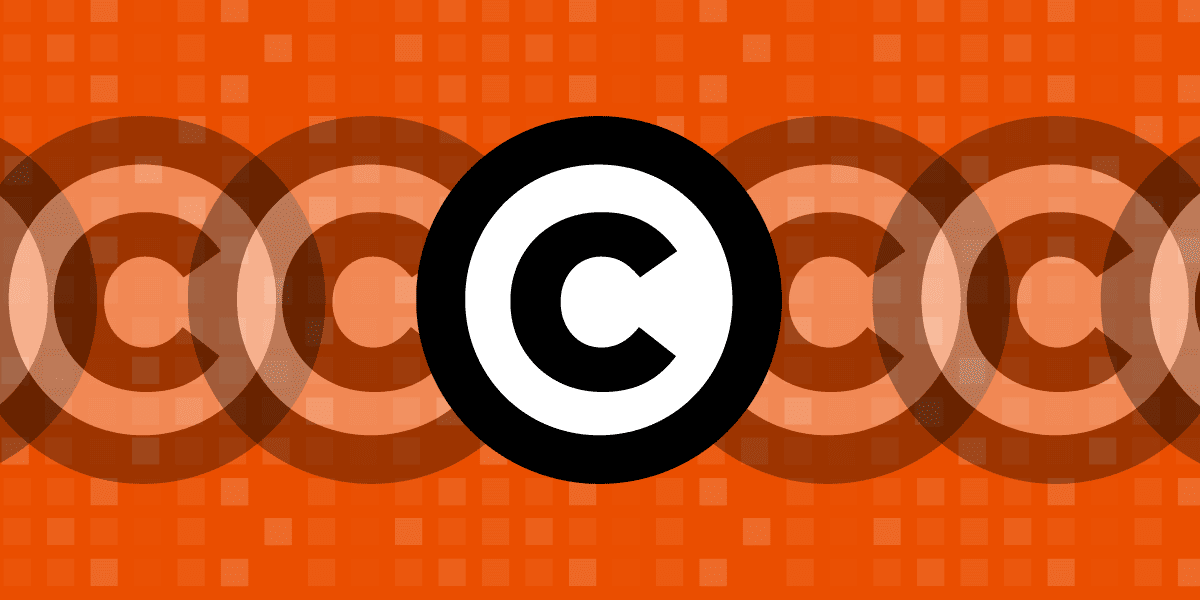 When it comes to software, it seems that no matter how many times a company loses on a clearly wrong copyright claim, it will soldier on--especially if it can find a path to the U.S. Court of Appeals for the Federal Circuit. The Federal Circuit is supposed to be almost entirely focused on patent cases, but a party can make sure its copyright claims are heard there too by simply including patent claims early in the litigation, and then dropping them later. In SAS v. WPL, that tactic means that a legal theory on software copyrightability that has lost in three courts across two countries will get yet another hearing. Hopefully, it will be the last, and the Federal Circuit will see this relentless opportunism for what it is. That outcome, however correct, is far from certain. The Federal Circuit got this issue very wrong just a few years ago, in Oracle v. Google. But with the facts stacked against the plaintiff, and a simpler question simpler to decide, the Federal Circuit might get it right this time. The parties in the case, software companies SAS Institute Inc. (SAS) and World Programming Ltd. (WPL), have been feuding for years in multiple courts in the U.S. and abroad. At the heart of the case is SAS's effort to effectively own the SAS Language, a high-level programming language used to write programs for conducting statistical analysis. The language was developed in the 1970s at a public university and dedicated to the public domain, as was software designed to convert and execute SAS-language programs. Works in the public domain can be used by anyone without permission. That is where the original SAS language and software executing it lives. A few years later, however, some of its developers rewrote the software and founded a for-profit company to market and sell the new version. It was alone in doing so until, yet more years later, WPL developed its own, rival software that can also convert and execute SAS-Language programs. Confronted with new competition, SAS ran to court, first in the U.K., then in North Carolina, claiming copyright infringement. It lost both times. Perhaps hoping that the third time will be the charm, SAS sued WPL in Texas for both patent and copyright infringement. Again, it lost--but it decided to appeal only the copyright claims. As with Oracle v Google, however, the fact that the case once included patent claims--valid or not--was enough to land it before the Federal Circuit. It is undisputed that WPL didn't copy SAS's actual copyrighted code. Instead, SAS claims WPL copied nonliteral, functional elements of its system: input formats (which say how a programmer should input data to a program to make the program work properly) and output designs (which the computer uses to let the programmer view the results correctly). These interfaces specify how the computer is supposed to operate--in response to inputs in a certain format, produce outputs that are arranged in a certain design. But those interfaces don't instruct the computer how it should perform those functions, for which WPL wrote its own code. SAS's problem is that copyright law does not, and should not, grant a statutory monopoly in these functional elements of a computer program. SAS is desperately hoping that the Federal Circuit will say otherwise, based on the Federal Circuit's previous ruling, in Oracle v. Google, that choosing among various options can suffice to justify copyright protection. In other words, if a developer had other programming options, the fact that it chose a particular path can allegedly be "creative" enough to merit exclusive rights for 70+ years. As we explained in our amicus brief, that reliance is misplaced. First, the facts of this case are different --WPL, unlike Google, didn't copy any actual code. Again, this is undisputed. Second, Oracle v. Google was based on a fundamentally incorrect assumption that the Ninth Circuit (the jurisdiction from which Oracle arose and, therefore, whose law the Federal Circuit was bound to apply) would accept the "creative choices" theory. How do we know that assumption was wrong? Because the Ninth Circuit later said so, in a different case. But SAS should lose for another reason. In essence, it is trying to claim copyright in processes and methods of operation--elements that, if they are protectable at all, are protected only by patent. If SAS couldn't succeed on its patent claims, it shouldn't be allowed to rely on copyright as a backstop to cover the same subject matter. In other words, SAS cannot both (1) evade the limits on patent protection such as novelty, obviousness, eligible patent subject matter, the patent claim construction process, etc.; and, at the same time (2) evade the limits on copyright protection by recasting functional elements as "creative" products. In addition to these points, our brief hopes to remind the court that the copyright system is intended to serve the public interest, not simply the financial interest of rights holders such as SAS. The best way for the Federal Circuit to serve that public interest here is to defend the limits on copyright protection for functional parts of computer programs, and to clarify its previous erroneous computer copyrightability ruling in Oracle v. Google. We hope the court agrees. |




